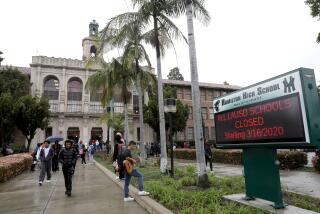Parents to Fight Closure of 5 Oakland Schools
OAKLAND — Parents, trustees and at least one principal say they are not giving up on five elementary schools slated for closure by the next school year, and plan to try to persuade the Oakland Unified School District’s top official to change his mind.
Randolph Ward, the state administrator brought in to run Oakland schools last June when the district turned to the state for help with a massive deficit, said he has no choice but to close the schools to save $2 million annually in overhead costs and improve education. His decision brought an outcry from about 1,000 parents, students and teachers at a meeting this month.
Ward said he chose schools that were poorly attended and whose students were not performing well so he could concentrate resources on fewer schools and lift achievement.
“Where else in this country do you serve 800 students with five sets of everything -- five sets of principals, five sets of secretaries, five sets of cafeterias, five sets of custodians?” he asked.
Ward said the district had 47,000 students in 117 schools. By comparison, Compton, where he last worked as a state administrator and trustee, had 32,000 students in 39 schools.
The Oakland district, which has struggled with a $57-million deficit over the last two years, acquired a $100-million line of credit from the state to keep afloat. Last year, the district eliminated 339 of its 2,807 teaching positions.
Since Ward arrived seven months ago, he has laid off 85 people, including custodians, clerical staff and central office administrators. He also took cell phones from most employees. The current operating deficit now stands at $9 million.
Part of the problem is declining enrollment. In three years, the district has lost 6,300 students as more singles move to the city from San Francisco and families leave for Tracy and Manteca to buy more affordable housing.
Still, not everyone agrees with Ward’s decision to close Burbank, Marcus Foster, Longfellow, John Swett and Toler Heights elementary schools. But the school board now has only advisory power since the state stepped in, and Ward has the ultimate authority.
“I’m against it,” said Dan Siegel, school board president. “The case hasn’t been made for closing schools.”
He said the estimated $250,000 annual savings per school would be offset by security costs to ensure the campuses were not vandalized, and the expense of moving furniture to other schools.
In addition, Siegel said, if the school lost 200 students to neighboring districts because angry parents decided to leave, that would wipe out all the savings.
But Ward said he wouldn’t let the closed schools remain empty for long. He already has received requests for the space from people who run adult education and special education programs within the district, and from community agencies interested in leasing space.
Siegel said parents and others have begun organizing to develop histories of each school showing academic achievement, attendance, improvements in teacher credentialing and community support.
Margaret Harris, principal of Marcus Foster Elementary School, said she had asked an educational consultant to pull together data to show that the school’s students had improved academically and that the campus was not as underutilized as the district contends.
Michelle Beauchamp, a mother of six who has three sons attending Marcus Foster, said she had gathered more than 100 signatures on a petition to present to Ward.
“My kids love this school,” said Beauchamp, who is a volunteer there. “I’m here as often as I can. The teachers are wonderful.”
More to Read
Sign up for Essential California
The most important California stories and recommendations in your inbox every morning.
You may occasionally receive promotional content from the Los Angeles Times.










